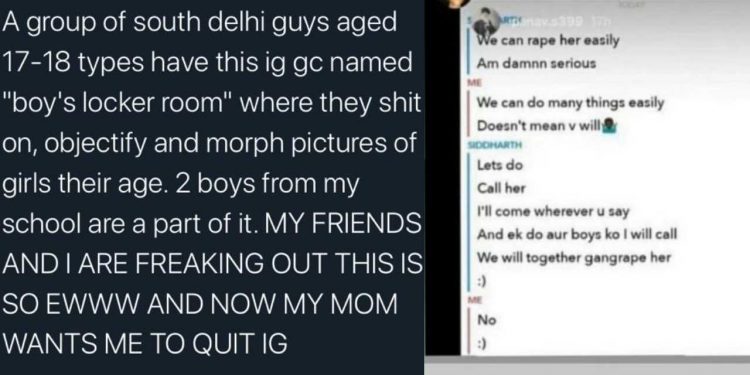New Delhi: At least 20 boys studying in at least four prominent schools in Delhi-NCR were part of an Instagram group in which members discussed raping their classmates and made lurid remarks while sharing their photos, police officials said Tuesday, as more details of what went on in the closed social media chatroom reignited concerns about sexual violence involving minors.
Investigators said the group, “Bois Locker Room”, had 22 members in all, and two of them were adults studying in colleges, after they took into custody a 15-year-old boy who was identified as the administrator.
“We have apprehended the 15-year-old boy and are questioning the adult members of the group,” said Anyesh Roy, the deputy commissioner of police of the Cyber Crime cell.
“While we are questioning the adults, we are also interviewing some minors. We know the names of most of them, but are still ascertaining their other details,” said an investigator involved in the case, asking not to be named. On Tuesday, 10 members had been questioned over phone, while the 15-year-old was sent to a remand home meant for juvenile suspects.
The content on the group included a remark by one member who suggested collecting a group of boys to gang rape a classmate, and several photos of schoolgirls that were accompanied with texts objectifying them. There were also copies of photos posted by girls on Instagram that were then appended with lewd and violent remarks.
The conversations were exposed after one of the boys in the group took screenshots and passed it on to someone else, said the officer, before it was posted on social media by one of the girls who was targeted.
“Some of the other teenagers we have interviewed claimed that they did not involve themselves in such conversations. One other student has said he saw these conversations as harmless. The student did not see the criminality in such conversations,” said the officer. The police said that they have seized some of their mobile phones to check if they were having similar discussions on other social media platforms as well.
On Monday, multiple such screenshots were shared on social media before the police took suo motu cognisance and registered a case invoking sections of the Information Technology Act and the Indian Penal Code dealing with the distribution of pornographic content and making objectionable remarks about women.
According to the investigator quoted above, the minor members will be booked under the juvenile justice act.
On Monday, authorities of one of the schools – where the whistleblower student studied — filed a complaint with the Delhi Police. “Once the screenshots emerged in the public domain, the group was deleted and another one created. Some girls were added in the new group to mislead police,” said the investigator.
The original group was created in early April, the investigator quoted above said, adding that it was yet to be verified if all screenshots being shared on social media were actually part of the actual conversations or if some were morphed or picked up from elsewhere.
Swati Maliwal, the Delhi Commission for Women chief, called out to other people who could possibly be members of such similar groups on other social media platforms, to exit such groups and report them to her. “Lockdown or not, such boys won’t be spared,” she said. On Monday, the DCW had issued notices to the Delhi Police and Instagram to respond to the allegations.
On Tuesday, the Delhi Commission for Protection of Child Rights (DCPCR) too took notice of news reports on the incident and issued a notice to the Delhi Police to take action in the case.
“From a broader perspective, try to understand how such things come to pass. Our society faces three different sets of stark realities. One, we are a discriminatory society; second, we are a society where there is normalisation of violence, especially in close relationships; and third, sexuality and violence are intricately enmeshed. If one triangulates these three realities then one recognises that such instances are not one-off… A substantive response has to be thought of. To begin with, each one of us must communicate with our children about respect, equality and empathy: between genders, between castes, between ethnicities, between identities, between people. It is when we recognise people as people first that we stop violence and humiliation,” saaid Achal Bhagat, senior psychiatrist, Apollo Hospital.






































